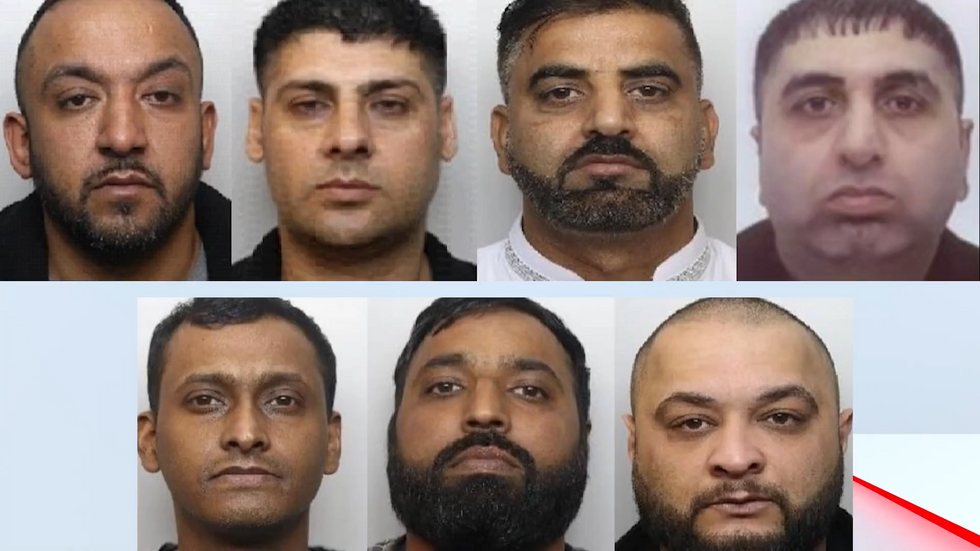Steven Edginton
Guest Reporter

A leaked government report on extremism claims that grooming gangs are used as a “grievance narrative” by “Right Wing extremists”, GB News can reveal.
The report, authored by a unit in the Home Office, stated: “Right Wing extremists frequently exploit cases of alleged group-based sexual abuse to promote anti-Muslim sentiment as well as related anti-government and anti-'political correctness' narratives.”
Suella Braverman, the former Home Secretary, told GB News that “to call grooming gangs and the industrial scale rape of young women across the UK part of a ‘grievance narrative’ is outrageous”.
The Conservative MP continued: “The language from this report is an insult to every young girl who was a victim of grooming gangs, an insult to everyone who is waiting for a school place or doctor’s appointment and is an insult to every person who loves this country.”
The Home Office report was authored by the Research, Information and Communications Unit (RICU), which was set up to tackle extremism and terrorism.
However, a Home Office source said: “This paper was not approved by Home Office Ministers.”

“Many of the points it makes are completely wrong and do not reflect the views of the Government.”
“In particular, child sexual abuse and grooming are immensely serious crimes, which devastate the lives of victims, and should always be discussed in the most serious terms and treated in the most serious way, which is why we are planning to strengthen the law to go after more of those who carry out this appalling abuse.”
The RICU memo claimed that “extremists can… be opportunistic and seek to exploit and twist topical issues to fit their wider narratives”.
The report then cited grooming gangs as an example, arguing that by exploiting issues extremists can reach a wider audience.
Grooming gangs victim Elizabeth, not her real name, said: “Political correctness led to thousands of young girls like me being abused without the authorities stepping in to save us. It’s not ‘extremist’ to recognise this.”
Elizabeth, who achieved a conviction against one of her abusers in 2018, said: “Tackling child abuse shouldn’t be about left or right wing, everyone should be working to stop this and change what led to the grooming gangs scandal.”
She added: “Labelling people who care about this issue as extremists is so dangerous.
“This is the sort of language and thinking that led to the coverup in my town and dozens of others.”
A Home Office source disavowed the report, saying: “For many years academics and analysts on radicalisation have used phrases like “grievance narratives” - the use of that phrase in this context was clearly wrong, and ministers have instructed officials to ensure there is no repetition of it in future Government documents.”

Richard Tice, the Reform Party Deputy Leader, said: “Being worried about predominantly Pakistani grooming gangs is not a “grievance narrative” or an extremist position.”
“By claiming such concerns are extreme Right-Wing, the Home Office is perpetuating the very reason these vile criminals got away with their crimes for so long.”
“We know that many people in positions of authority felt terrified of being labelling racist, so did not properly investigate the systemic rape and grooming of young British children.”
“Instead of calling concerns around grooming gangs as extremist, the government should listen to the public who are rightly worried about such a horrific crime.”
The 2015 Casey report into Rotherham Council's handling of grooming gangs found that "misplaced 'political correctness'" cemented the organisation's failures.
The report quoted several police officers who said fear of racism contributed to victims being let down by those in positions of authority.
On a section focussed on Right-Wing extremism, RICU listed other “grievance narratives” used by the “Extreme Right-Wing”.
These included: “anti-immigration, anti-LGBTQ+, anti-communism/left-wing, anti-Muslim, antisemitism, anti-feminism, and demographic change.”
The report continued: “This is usually foregrounded by a sense of crisis and decline in society; society is presented as degenerating and heading toward an abyss.”
Responding to the RICU report, Mrs Braverman described it as a “sensational document [that] shows what the Labour government really thinks about millions of hardworking British people”
“They are labelling opponents with all sorts of names to silence them,” she continued.
“During my time as Home Secretary, RICU rightly dealt with Islamist terror as well as threats from genuine, far right extremists.”
“The truth is millions of British people worry about what is happening to their country. They don’t want to see the fabric of their society be changed by migration on a massive scale, to paint them as racists, as ‘fruit cakes and looneys’ as ‘conspiracy theorists’ is reprehensible.”
The RICU report also labelled cultural nationalism, defined as the “main belief [being] that 'Western culture’ is under threat from mass migration”, as being an Extreme Right-Wing view.
The report has received backlash from conservative politicians who say that mainstream views on the Right are being labelled as extremist.
Concerns have been raised about the implications on freedom of speech due to such labelling.
A Home Office source said: “On the other issues raised, the Government has said many times that it shares the very legitimate concerns people across the country have on immigration and small boat crossings. This is why we recently announced an additional £150million of investment in border security and have committed to cut net migration from record levels under the Tories.
Keeping the public safe is the first duty of any Government and we take the threat from violent extremism very seriously. The majority of this is Islamist extremism, followed by far right extremism and other violent fixations with growing threats and radicalisation among teenagers. We are looking at ways to ensure the government is better prepared to respond where public safety is at risk.”
Additional reporting from Charlie Peters.
Find Out More...
